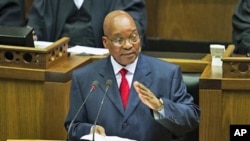South African president Jacob Zuma will travel to Mauritania and Ivory Coast as part of the African Union’s initiative aimed at resolving the political crisis in Ivory Coast.
Zuma joins the high-level African Union panel led by Mauritanian President Mohamed Ould Abdel Aziz, and which also includes the leaders of Burkina Faso, Tanzania and Chad. They hope to end the stalemate following the refusal of incumbent Ivorian president Laurent Gbagbo to step down in favor of Alassane Ouattara, the U.N. certified winner of the country’s presidential election in November.
Before traveling to Ivory Coast, the heads of state first will be briefed in Mauritania by a team of experts who have spent weeks working with the opposing parties.
But the success of the initiative already is in doubt because some of the leaders are viewed as biased by some Ivorians. Gbagbo’s supporters oppose the inclusion of the Burkina Faso president because he is an ally of Ouattara. Meanwhile, some of Ouattara’s supporters, and some members of the West African regional bloc ECOWAS, believe South Africa has aligned itself with Gbagbo.
Clayson Monyela, spokesperson for the South African Department of International Affairs and Cooperation, said South Africa is neutral in the dispute and has been talking to both sides trying to find a way to break the impasse.
“[International Affairs and Cooperation] Minister Maite Nkoane-Mashabane has been receiving delegations from both Ouattara's people, and Gbagbo's people, and both of them have confirmed that they view South Africa as an impartial honest peace broker,” said Monyela.
But South Africa’s standing as an honest broker was disputed by senior ECOWAS officials when it deployed the SAS Drakensberg to the Gulf of Guinea. The ship was put on standby for a possible evacuation of South African diplomats and other citizens in the event of serious conflict in Ivory Coast.
The Drakensberg is a support and supply vessel of the South African Navy and has been frequently deployed on rescue and diplomatic missions. But it took more than two weeks for officials to clearly enunciate the vessel’s mission in the region and for Zuma to discuss the matter with leaders in West Africa.
“And we have also emphasized that at no stage has the SAS Drakensberg entered the Ivorian territorial waters," said Monyela. "By the way, this ship is a non-combatant support ship, with a non-aggressive posture. So we thought it was important for us to clarify because clearly some people had gotten the wrong idea.”
South Africa’s role in the region also has troubled ordinary Ivorians at home and in South Africa. Rumors are widespread that the Drakensberg will be used as a launching pad for an attack against Ouattara supporters, or to prop up Gbagbo; or even that it is there to remove what some say are Gbagbo’s ill-gotten riches.
Monyela rejects the suggestion South Africa waited too long to fully explain itself. “And we are quite comfortable from where we are sitting that the matter has been clarified both to ECOWAS and to Ouattara and Gbagbo's people in the Ivory Coast, including the population.”
The panel’s mission is expected to conclude by next Tuesday.
South Africa President Joins AU Panel Heading to Ivory Coast












